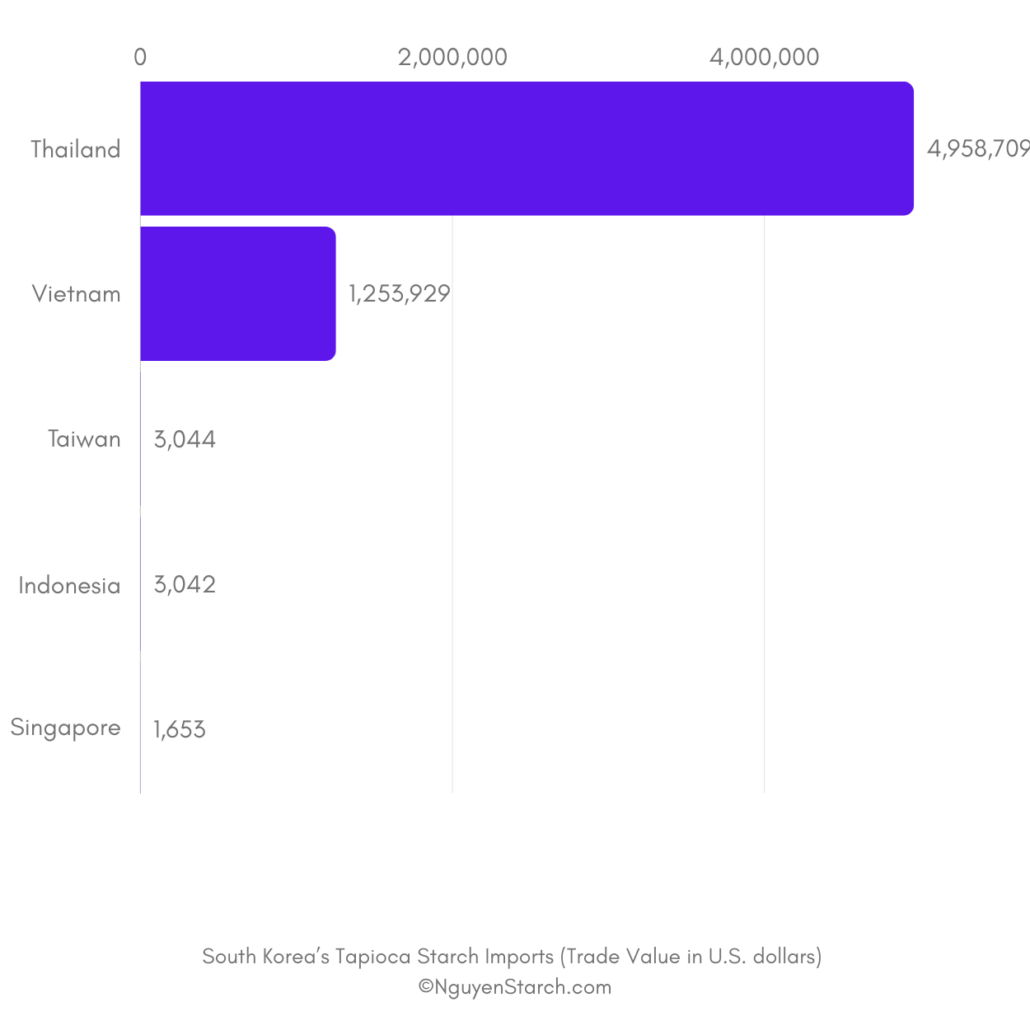South Korea’s involvement in the tapioca starch trade highlights its evolving role as both an exporter and importer. As an exporter, South Korea primarily serves Australia, but also exports to markets like Singapore, the United States, China, and Canada. As an importer, South Korea relies on suppliers such as Thailand, Vietnam, and Chinese Taipei to fulfill its domestic tapioca starch demand.
Exports
In 2021, South Korea contributed $7.09k to the global tapioca starch export market, positioning itself as the 72nd largest exporter of tapioca starch worldwide. Tapioca starch held the 4268th spot on South Korea’s list of exported products, reflecting its moderate significance in the country’s export portfolio.
Australia emerged as the primary destination for South Korea’s tapioca starch exports, importing a substantial amount valued at $6.19k. Singapore followed with imports totaling $645, while the United States, China, and Canada imported $183, $28, and $28 worth of tapioca starch, respectively.
Between 2020 and 2021, South Korea experienced notable growth in its export markets for tapioca starch. Singapore exhibited the highest increase, with an additional $645 worth of imports. Denmark and Thailand also contributed to this growth, importing an extra $9 and $4 worth of tapioca starch, respectively.
| Continent | Country | Trade Value |
| Asia | China | 28 |
| Asia | Singapore | 645 |
| Asia | Thailand | 9 |
| Europe | Denmark | 9 |
| North America | Canada | 28 |
| North America | United States | 183 |
| Oceania | Australia | 6,188 |
Imports
In 2021, South Korea stood as the 18th largest importer of tapioca starch globally, with imports valued at $6.22M. Tapioca starch ranked 2778th among the products imported by South Korea, underscoring its moderate import volumes. South Korea primarily sourced tapioca starch from Thailand, with imports amounting to $4.96M. Vietnam followed closely with imports of $1.25M, while Chinese Taipei, Indonesia, and Singapore contributed $3.04k, $3.04k, and $1.65k worth of tapioca starch imports, respectively.

Between 2020 and 2021, South Korea witnessed significant growth in its import markets for tapioca starch. Thailand emerged as the leading supplier, with an increase of $646k in tapioca starch imports. Vietnam also exhibited notable progress, contributing an additional $138k to South Korea’s imports. Chinese Taipei joined the ranks of growing import markets, with imports amounting to $1.77k.
| Continent | Country | Trade Value |
| Africa | Nigeria | 1 |
| Asia | China | 22 |
| Asia | Indonesia | 3,042 |
| Asia | Japan | 40 |
| Asia | Malaysia | 5 |
| Asia | Philippines | 4 |
| Asia | Singapore | 1,653 |
| Asia | Thailand | 4,958,709 |
| Asia | Vietnam | 1,253,929 |
| Asia | Chinese Taipei | 3,044 |
| Europe | Austria | 16 |
| Europe | Denmark | 9 |
| Europe | Netherlands | 20 |
| Europe | Russia | 25 |
| North America | Mexico | 4 |
| North America | United States | 18 |
Importing Tapioca Starch from Vietnam: A Reliable Partnership
Vietnam has emerged as a prominent supplier of tapioca starch to the South Korea market. In 2021, the total value of tapioca starch imports from Vietnam amounted to an impressive $1,253,929. This significant figure indicates that Vietnam’s tapioca starch holds a strong position in the market and is poised to maintain its presence in South Korea in the years to come. The reasons behind this sustained importation are primarily attributed to the product’s superior quality and competitive pricing.
South Korea benefits from Vietnam’s tapioca starch exports, which provide a dependable supply of this vital ingredient. The substantial import value from Vietnam underscores South Korea’s confidence in Vietnam as a trusted and preferred partner for fulfilling its tapioca starch requirements. With its consistent quality and competitive pricing, Vietnam’s tapioca starch has proven to be a reliable source that meets South Korea’s demand for this essential product.
Tariffs
In 2018, South Korea imposed an average tariff of 429% on tapioca starch imports. Notably, countries such as Angola, Burundi, Benin, Burkina Faso, and Botswana had the highest import tariffs, with a Most Favoured Nation duty rate treatment of 455%.
These tariffs aimed to protect and support the local tapioca starch industry in South Korea by creating a conducive environment for domestic producers. The intention was to foster self-sufficiency and safeguard national interests amid international competition.
Source: BACI and General Statistics Office of Vietnam
